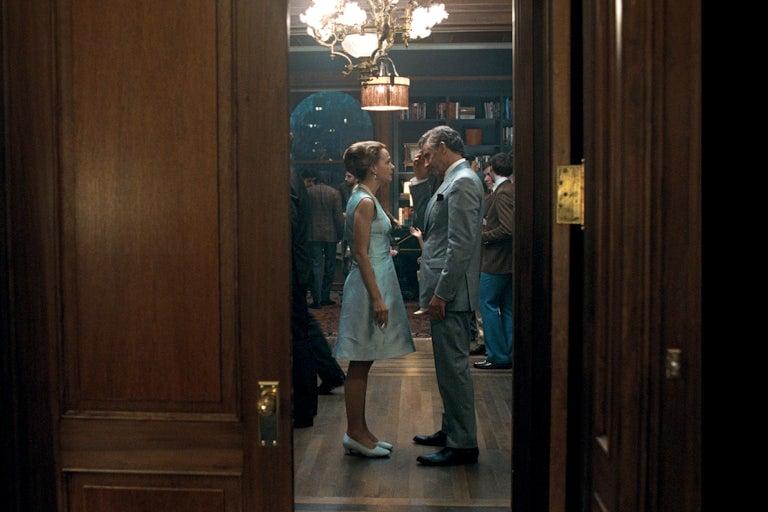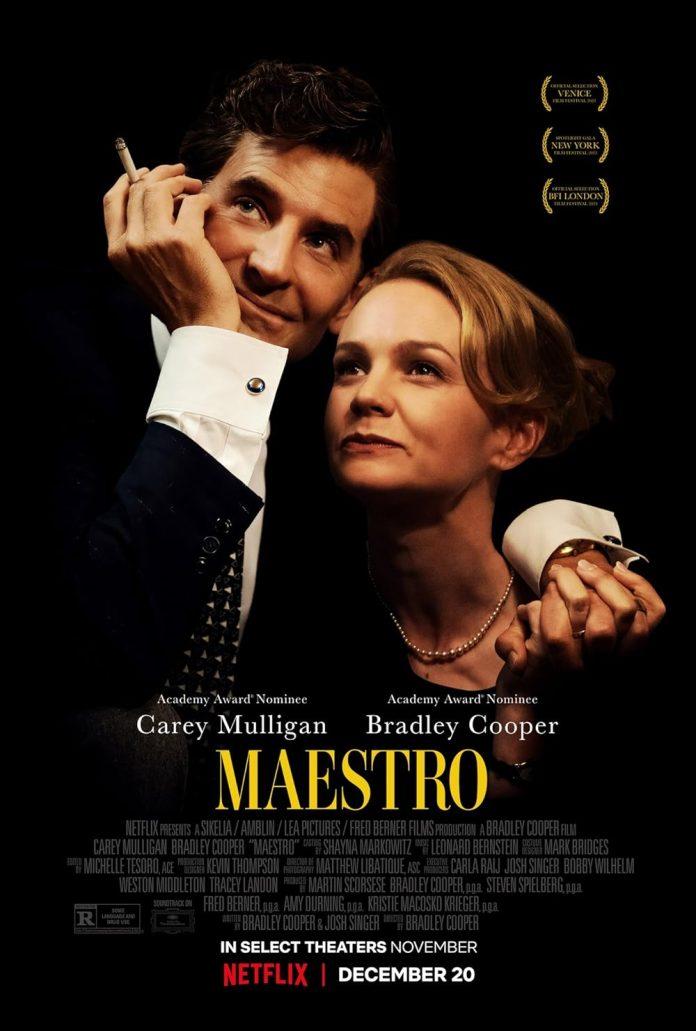Bradley Cooper attempts to showcase his filmmaking acumen both in front of and behind the camera in Maestro. Unfortunately, his performance in both regards leaves a little to be desired.
Maestro is a film that is both ambitious and ambiguous in many regards, but in one area it is frighteningly straight-forward; smoking is bad. Yes, that’s right, a film attempting to herald one of the greatest American musical minds of the 20th century is perhaps more convincing as a statement about the inherent dangers of smoking than it is as a prestige biopic. I am not exaggerating when I say that the main characters both smoke in just about every single scene, and unfortunately they both will ultimately pay the price.
It’s messy. It’s distracting. It’s hard to make out what Bradley Cooper is saying as he repeatedly fumbles with a cigarette between his lips. Classic Hollywood always made smoking look so cool and effortless. This film tries to mimic that lost staple of cinema, but it feels forced and unnatural, which comes off more like a sick joke. It’s not that it disingenuously represents the real people it is trying to depict, it is that the film itself focuses excessively on smoking. It is unnecessary, boastful, and speaks to one of the many creative mistakes on display.
Maestro
Directed By: Bradley Cooper
Written By: Bradley Cooper, Josh Singer
Starring: Bradley Cooper, Carey Mulligan, Matt BomerRelease Date: November 22nd, 2024 (Netflix)
Feature films only have so much screen time. Filmmakers must make careful decisions about what is and is not important to depict on screen, so that their message is clearly conveyed. In Maestro’s case, the audience didn’t need to see the main character’s smoking indulgences repeated ad nauseam. We got the picture after the very first scene when the main character receives the most important phone call in his life and has to pause to light a cigarette. It is abundantly clear from that point on how the film wanted to show how the main character’s overindulgences would catch up with him. Spending so much screen time repeating the same red flag only insults the intelligence of the audience.
Great films never insult the audience’s intelligence. We can live with too little information – it leaves things open to interpretation. But too much information is a waste of time. Maestro is a film that cycles between these two extremes. There are moments where the narrative and script are fleeting. We get a glimpses of a character at a point in their life where the details are not really important, only their condition at that moment. In those moments the film is mesmerizingly beautiful – simply caught up in the wake of life moving forward. At other times it slams on the brakes and lingers where it does no good, luring the audience into believing the film’s breakneck pace will calm down for a moment, but it’s just a tease.

Maestro tells the story of Leonard Bernstein, famous American composer, conductor, and musician. The film opens with an elderly Bernstein (Bradley Cooper) reflecting upon his life, and the film proceeds as a series of flashbacks. The first flashback is the beginning of Bernstein’s career, showing us the phone call he received which catapulted him to stardom. We see when he meets the actress Felicia Montealegre (Carey Mulligan) at a party, and they fall in love and become husband and wife. The film moves forward in time, depicting the couple’s growing family, and their increasingly successful careers. However, Leonard’s self indulgence in drugs, alcohol, and extramarital affairs threatens to destroy everything they created together. When a terrible tragedy strikes, he is forced to reevaluate his priorities, but not necessarily his choices in life.
As both lead actor and director, Cooper has a lot of responsibility, and unfortunately the film feels like it was too much for him in both regards. The film, and his performance, both needed some editing. Providing the plot through a series of flashbacks does allow the story to pick and choose what to show without feeling too forced. However, when you are trying to summarize the entire life of a person in 2 hours, it is a daunting task no matter what. The film would have been better served focusing on a key moment or shorter time period. You can feel Cooper’s excitement and interest in the subject matter, it just feels like he got so swept up in it he could not see the forest through the trees.

I also have a problem with the way the film depicts its main character. For a film attempting to celebrate Leonard Bernstein’s legacy, it sure does feel critical against him. Rather than demonstrate his accomplishments organically, the film makes the inexplicable decision of having Leonard talk about them after they have already occurred. This creates two problems. First, the character’s constant discussion about himself makes him feel narcissistic. Second, the film mistakenly assumes the audience has as much enthusiasm and/or knowledge about Bernstein’s life as Cooper does. In this regard, the film ends up feeling as self-indulgent as the main character.
What results is the first time I can remember being outright annoyed by the subject of a prestigious biopic. Cooper’s energetic performance certainly doesn’t help. When he isn’t mumbling incoherently with a cigarette glued to his lower lip, he’s on some flamboyant escapade where he seems completely beyond any sort of self control. The film and Cooper do find Leonard’s attractive enigma in those few moments we see him in his element; conducting music. But those glimpses are infrequent and serve only to remind the audience of the juxtaposition between his personal and professional lives.
We never see Leonard grow to become the famous figure he is best known as. Actually, he doesn’t really change much at all. The film simply starts him off at the precipice of success as if it is an excuse to put up with his boorish behavior. The film wants to make a point about trying to separate the art from the artist, but Leonard never feels sincere in anything he does. Furthermore, the film never conveys the threads of tortured persona that lead to the profound artist because it never really does the work to find them in the first place. Leonard’s life is awash in controversy, but the film only commits to addressing the bare minimum almost as if it is afraid to wade too deep. Ironically, by skirting controversy, the film invites it.

Leonard repeats his profound love for Felicia, and her ultimate struggles do weigh heavily upon him. But the film misses a huge opportunity to demonstrate that relationship into something more than just one of convenience. Really, the film’s most compelling character is Felicia, and it hinges on Mulligan’s excellent performance. Felicia admits to knowing what she was getting herself into by entering an open relationship with Leonard because it was the only way to have him in her life. But she comes to realize how this decision ultimately ended up hurting them both. Leonard is too selfish to see this before it is too late. He has countless opportunities to address his shortcomings with the people who care about him, but he can’t accept his own failures – he just wants to forget about them.
Echoing this sentiment, Maestro is a film that doesn’t go far enough. It has the persona, the set-up, and all the criteria you would expect for a typical “tortured artist” drama. But it doesn’t set itself apart by either going deep enough into its subject matter, or heaping convincing praise upon it in celebration. Instead, it feels like it gets to an amicable ending by default. A more experienced filmmaker would have been able to find something more profound, and would not have gotten as distracted in showmanship. This is the cinematic equivalent of bowling with the bumpers on.
















